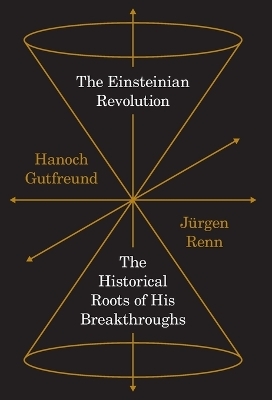
The Einsteinian Revolution
The Historical Roots of His Breakthroughs
Seiten
2023
Princeton University Press (Verlag)
978-0-691-16876-0 (ISBN)
Princeton University Press (Verlag)
978-0-691-16876-0 (ISBN)
How the Einsteinian revolution can be understood as the result of a long-term evolution of science
The revolution that emerged from Albert Einstein’s work in the early twentieth century transformed our understanding of space, time, motion, gravity, matter, and radiation. Beginning with Einstein’s miracle year of 1905 and continuing through his development of the theory of general relativity, Einstein spurred a revolution that continues to reverberate in modern-day physics. In The Einsteinian Revolution, Hanoch Gutfreund and Jürgen Renn trace the century-long transformation of classical physics and argue that the revolution begun by Einstein was in fact the result of a long-term evolution. Describing the origins and context of Einstein’s innovative research, Gutfreund and Renn work to dispel the popular myth of Einstein as a lone genius who brought about a revolution in physics through the power of his own pure thought. We can only understand the birth of modern physics, they say, if we understand the long history of the evolution of knowledge.
Gutfreund and Renn outline the essential structures of the knowledge system of classical physics on which Einstein drew. Examining Einstein’s discoveries from 1905 onward, they describe the process by which new concepts arose and the basis of modern physics emerged. These transformations continued, eventually resulting in the establishment of quantum physics and general relativity as the two major conceptual frameworks of modern physics—and its two unreconciled theoretical approaches. Gutfreund and Renn note that Einstein was dissatisfied with this conceptual dichotomy and began a search for a unified understanding of physics—a quest that continued for the rest of his life.
The revolution that emerged from Albert Einstein’s work in the early twentieth century transformed our understanding of space, time, motion, gravity, matter, and radiation. Beginning with Einstein’s miracle year of 1905 and continuing through his development of the theory of general relativity, Einstein spurred a revolution that continues to reverberate in modern-day physics. In The Einsteinian Revolution, Hanoch Gutfreund and Jürgen Renn trace the century-long transformation of classical physics and argue that the revolution begun by Einstein was in fact the result of a long-term evolution. Describing the origins and context of Einstein’s innovative research, Gutfreund and Renn work to dispel the popular myth of Einstein as a lone genius who brought about a revolution in physics through the power of his own pure thought. We can only understand the birth of modern physics, they say, if we understand the long history of the evolution of knowledge.
Gutfreund and Renn outline the essential structures of the knowledge system of classical physics on which Einstein drew. Examining Einstein’s discoveries from 1905 onward, they describe the process by which new concepts arose and the basis of modern physics emerged. These transformations continued, eventually resulting in the establishment of quantum physics and general relativity as the two major conceptual frameworks of modern physics—and its two unreconciled theoretical approaches. Gutfreund and Renn note that Einstein was dissatisfied with this conceptual dichotomy and began a search for a unified understanding of physics—a quest that continued for the rest of his life.
Hanoch Gutfreund is professor emeritus of theoretical physics at the Hebrew University of Jerusalem, where he is also academic director of the Albert Einstein Archives. Jürgen Renn is director at the Max Planck Institute for the History of Science in Berlin and founding director of the newly established Max Planck Institute of Geoanthropology in Jena. He is the author of The Evolution of Knowledge (Princeton). Gutfreund and Renn are the authors of Einstein on Einstein and The Formative Years of Relativity (both Princeton).
| Erscheinungsdatum | 10.11.2023 |
|---|---|
| Zusatzinfo | 7 b/w illus. |
| Verlagsort | New Jersey |
| Sprache | englisch |
| Maße | 155 x 235 mm |
| Themenwelt | Geisteswissenschaften ► Philosophie ► Erkenntnistheorie / Wissenschaftstheorie |
| Naturwissenschaften ► Physik / Astronomie ► Relativitätstheorie | |
| ISBN-10 | 0-691-16876-8 / 0691168768 |
| ISBN-13 | 978-0-691-16876-0 / 9780691168760 |
| Zustand | Neuware |
| Informationen gemäß Produktsicherheitsverordnung (GPSR) | |
| Haben Sie eine Frage zum Produkt? |
Mehr entdecken
aus dem Bereich
aus dem Bereich
die Grundlegung der modernen Philosophie
Buch | Softcover (2023)
C.H.Beck (Verlag)
CHF 25,20
Buch | Softcover (2023)
Reclam, Philipp (Verlag)
CHF 9,80

![Was heißt Denken?. Vorlesung Wintersemester 1951/52. [Was bedeutet das alles?] - Martin Heidegger](/media/113619842)
